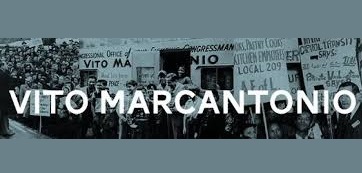A Momentum towards Remembrance
Over several months the Vito Marcantonio Forum had begun a collaboration with the Drama Workshop Project in its second phase of activity to remember legendary Congressman Vito Marcantonio on the 60th anniversary of his death. Following up on the official commemoration at Woodlawn Cemetery, “The Vito Marcantonio Phenomenon: A Theatrical Reconstruction of Marcantonio’s Effective Radical Legacy” was gathering much momentum leading up to October 19. Gaetana’s Restaurant was planning a welcoming atmosphere to friends and newcomers to celebrate Marcantonio’s life and reflect on his passing.
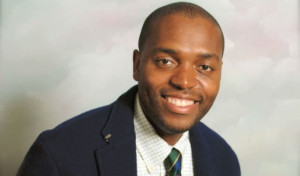
The Irony of a New Reason to Mourn
Then news of tragedy emerged 10 days before the event. Morgan Powell, founding member of the Vito Marcantonio Forum, had suddenly and inexplicably passed away. No one knew the details. Morgan, like Marcantonio, advocated for social justice, had a passion for history and its application – Morgan as a historian and community leader and Marcantonio as a political leader. Morgan applied these interests toward developing walking tours of the Bronx in connection of African Americans and the Bronx River. I met Morgan when the city was revamping its recycling policies in 2003, but I observed his interest in all aspects of environmental conservation and sustainability.
However, over the ten days leading up to “The Vito Marcantonio Phenomenon” event, we realized Morgan ironically and sadly shared another element with Marcantonio: he had not yet received a
proper burial. No family member had claimed his body to make a formal funeral arrangement. So his remains still remain with the City of New York. This sense of limbo was not elusive to those of us who are aware that Marcantonio’s passing — while motivating a memorial committee to form and raise money for a resting place and a book compiling his speeches — lacks closure because Cardinal Spellman refused to give him a Catholic burial.
Improvised Memorial
“The Vito Marcantonio Phenomenon” began with an improvised memorial for Morgan. After showing a 2.5 minute videoput together by David Giglio offering a glimpse into Morgan’s life, Dr. Gerald Meyer began with a heartfelt eulogy reflecting on Morgan’s interest in social justice and how much of the work of Vito Marcantonio resonated with him.
After Gerald led a one minute moment of silence, there was a brief intermission and then the official program began.
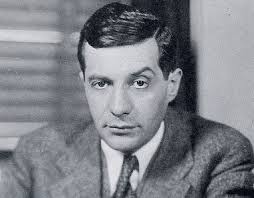
The Recap on the Official August 9th Commemoration
Approximately 50 to 60 attended the October 19 event, which was filmed by David Giglio and whose visuals were overseen by Adam Meyer, who worked Kevin O’Connor on acoustics.
The “Vito Marcantonio Phenomenon” began with introductions, identifying both sponsoring organizations, and noted the event would present “The People’s Proclamation for The People’s Politician.”
The Marcantonio Phenomenon: The Set Up
The first presentation was a very brief poem written by VMF member, Gil Fagiani, entitled “Litany of San Vito,” and read by Adam Meyer. It has become a tradition for the VMF to begin its events with this poem. It serves as a clearing statement or prayer. Everyone followed along with a copy of the poem in a postcard at their seats (distributed along with their programs).
These postcards looked like mass cards for Marcantonio. Co-emcee, Marilyn Ocasio, of the Drama Workshop Project, introduced a brief film by David Giglio entitled: Vito Marcantonio (1902-1954): Synopsis of A Large Life.
With a narration written by Gerald and myself with my recitation as voiceover, the film briefly appetizes the attendees with bits and pieces of Marcantonio’s life and contributions, the role of the Vito Marcantonio Forum, and the success of advancing knowledge of Vito Marcantonio through our August 9 event.
The People’s Proclamation for the People’s Politician and Performances: Theatrical Reconstructions and Juxtapositions
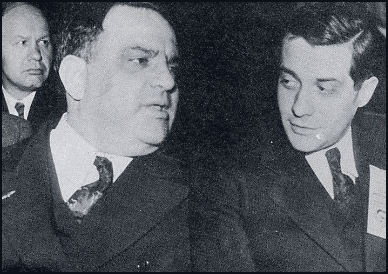
With Marilyn Ocasio guiding the remainder of the program, Frank Marcantonio announced the beginning of The People’s Proclamation for the People’s Politician and read the first few whereas clauses about Marcantonio’s Italian background and his childhood, touching on Dr. Leonard Covello’s role as his high school teacher, intellectual mentor, mentor, and collaborator. Eduardo Sanchez then performed a dramatization of Leonard Covello reading from his autobiography, The Heart is the Teacher, reflecting on his encounters when he taught Marcantonio at Dewitt Clinton High School. In the scene, set in 1921, young Marcantonio and Board of Alderman President Fiorello LaGuardia interject themselves on cue as Covello’s reflections also serve as narration.
After a reading from the proclamation by Alfonzo Hollis about Marcantonio’s political work for Fiorello LaGuardia and his constituency services for over 300 people per week from different ethnic backgrounds and races, Sarah Marcantonio Coursey continued with a set of whereas clauses about Marcantonio’s advocacy for Italian Americans. Marilyn Ocasio then introduced a dramatization with me as Marcantonio delivering a speech to a radio audience in July 1942 defending Italian Americans against discrimination during World War II when they were under suspicion because the United States was at war with the nation of Italy. Marilyn pointed out the speech was submitted to the Congressional Record and was one of several speeches in the program that are included the book, I Vote My Conscience: The Writings, Speeches, and Debates of Vito Marcantonio.
After VMF member Christopher Bell read several Whereas clauses highlighting Marcantonio’s fight against the poll tax and for anti-lynching laws, his successful defense of W.E.B. Dubois and William Paterson, the appearance of the three together before the United Nations Security Council on behalf of African Americans, and the Congressman’s role in breaking the major league baseball color barrier, an astonished audience resoundingly applauded these accomplishments. Grasping the format of the event, the audience would also warmly acknowledge each reader, especially when a celebrity, such as Frank Sinatra or Jackie Robinson, became part of the drama in the story. After Bell’s reading, I dramatized a splicing of Marcantonio’s speeches from 1949 to the House of Representatives opposing the poll tax.
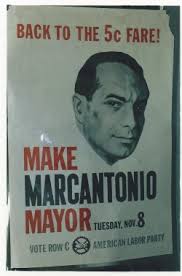 Ocasio then introduced Rita Barakos, whose singular yet comprehensive ‘Whereas’ clause spoke to Marcantonio’s advocacy for Puerto Rico and Puerto Ricans. I then dramatized a Marcantonio speech from 1947 about Puerto Rico’s plight as a result of US economic policy and the cause of Puerto Rican migration to the mainland, indirectly addressing the misconception that the East Harlem Representative “brought the Puerto Ricans to New York” – propaganda used to mobilize voters against him.
Ocasio then introduced Rita Barakos, whose singular yet comprehensive ‘Whereas’ clause spoke to Marcantonio’s advocacy for Puerto Rico and Puerto Ricans. I then dramatized a Marcantonio speech from 1947 about Puerto Rico’s plight as a result of US economic policy and the cause of Puerto Rican migration to the mainland, indirectly addressing the misconception that the East Harlem Representative “brought the Puerto Ricans to New York” – propaganda used to mobilize voters against him.
After a set of ‘Whereas’ clauses read by Eduardo Sanchez regarding Marcantonio’s political party designations, his movement into the American Labor Party, and the effort to get rid of him through the Wilson Pakula Act, four members of the Drama Workshop Project performed a scene written by me combining historical facts and creative license about the circumstances of the time. It was a scene between LaGuardia, played by Art Bernal, and Marcantonio arguing over the prospect of creating a viable third party and weighing the propaganda of criticism against Marcantonio by the press and the political establishment. In that scene, Eduardo Sanchez plays a WCBS radio broadcaster. Marilyn Ocasio served as the narrator.
Following the scene, Art Bernal explained the drama behind the campaign of 1948 (written by me to be non-partisan): “With all of America watching, Marcantonio would win in 1948 despite the Wilson Pakula Act. However, LaGuardia’s death in September 1947 would deprive the Progressive Party of a formidable Vice Presidential candidate in the 1948 election cycle.” As Adam Meyer placed the famous photo on the screen of President Harry Truman from 1948, Bernal pointed out that “we now see an endearing image of Democrat Harry Truman winning the 1948 presidential race, despite the predictions by the newspapers that night that he would lose to Republican Thomas Dewey,” noting the Chicago Daily Tribune’s premature headline –Dewey Defeats Truman — which “Truman holds, beaming with glee.” Bernal’s presentation underscores the failure of people to know or recognize the Presidential race was close partly due to the Progressive Party’s siphoning of votes from the Democratic Party, and that the Democratic Party adopted portions of the Progressive Party’s agenda, including civil rights, to avoid defeat.
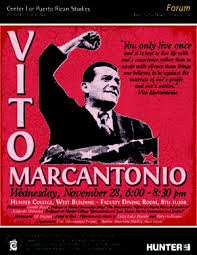 The presentation asked the public to imagine if LaGuardia had lived and campaigned as the Vice Presidential candidate with Vito Marcantonio, Henry Wallace, and actor/activist, Paul Robeson for the Progressive Party: “The Progressive Party could have pulled away enough votes, for Republican Dewey to actually beat Truman, making the Progressive Party a force to be reckoned with as a third party.” Referring back to the dramatization of the anti-poll tax speech, Bernal pointed out that when the Democrats abandoned their civil rights agenda in 1949, Marcantonio took aim at Northern hypocrisy, and criticized a New York City run by Mayor Bill O’Dwyer that was fraught with discrimination, segregation, and police brutality – an admission Marcantonio readily makes to his Southern Congressional colleagues in the dramatized speech before the House of Representatives.
The presentation asked the public to imagine if LaGuardia had lived and campaigned as the Vice Presidential candidate with Vito Marcantonio, Henry Wallace, and actor/activist, Paul Robeson for the Progressive Party: “The Progressive Party could have pulled away enough votes, for Republican Dewey to actually beat Truman, making the Progressive Party a force to be reckoned with as a third party.” Referring back to the dramatization of the anti-poll tax speech, Bernal pointed out that when the Democrats abandoned their civil rights agenda in 1949, Marcantonio took aim at Northern hypocrisy, and criticized a New York City run by Mayor Bill O’Dwyer that was fraught with discrimination, segregation, and police brutality – an admission Marcantonio readily makes to his Southern Congressional colleagues in the dramatized speech before the House of Representatives.
Picking up on the last thread, Marilyn Ocasio refers to a campaign poster from David Giglio’s film along with the photo of Ralph Fasanella’s painting in the written program (displayed on the screen by Adam Meyer) to help the audience visualize Marcantonio’s 1949 run for Mayor against Bill O’Dwyer. In the painting, entitled Marcantonio for Mayor, Marcantonio gives a speech in 1949 at a distant podium at the Lucky Corner of East 116th Street and Lexington Avenue. Marilyn noted, “Marcantonio would lose the Mayor’s race despite his many votes, and this would set up his last stand in 1950.”
Terry Doyle recited a series of Whereas clauses describing Marcantonio’s opposition to popular legislation, including the anti-labor Taft-Hartly Act, and politically charged foreign policy positions, casting the sole votes against the Marshall Plan and intervention in the Korean conflict. This segued to the final Marcantonio dramatization. My presentation spliced two speeches by Marcantonio from July 1950 in which he opposes the Korean War, and his final speech in 1950 when he warns America against militarism and unjustified foreign intervention.
The Final Reflections
Alfonzo Hollis’ reading of a series of Whereas clauses pondered the impact of Marcantonio’s death set up the performance of Paul Robeson’s eulogy to Marcantonio. Robeson’s remarks had been published in his newspaper – called Freedom – when Marcantonio died, but were never orated in any gathering. The performance on October 19th was a dramatization of how Paul Robeson would have delivered that speech had he addressed an audience on the day Marcantonio died. The speech so captured Robeson’s deep felt sentiments through a slow, impassioned voice with brief moments of pause for reflection, the presentation received a standing ovation.
Marilyn Ocasio then called Frank Marcantonio back up to the podium to conclude The People’s Proclamation, providing a symmetry for his setting the proclamation in motion at the beginning of the program. He pointed out Cardinal Spellman’s refusal to provide a Catholic burial, Marcantonio’s interment at historic Woodlawn cemetery near his wife and Fiorello LaGuardia, and with emotion building up and contained, Frank shared the words on Marcantonio’s tombstone: “Vito Marcantonio: Defender of Human Rights.” After pointing to the growing interest in Marcantonio’s life since the late 1990’s, he declares the final resolution statements towards which the Whereas clauses had been building:
Therefore, be it known, that The Vito Marcantonio Forum is convinced that the life and work of Vito Marcantonio have been unfairly ignored and present to people today guidelines for a progressive politics that promises significant gains for a more genuinely democratic United States; and
Therefore, be it further known, that the those assembled and future signators of any paper or online petition of “The People’s Proclamation for The People’s Politician,” with pride, honor the contributions of Representative Vito Marcantonio and their benefit to New York City, the nation, and the world along with the efforts of the Vito Marcantonio Forum to honor the Congressman’s memory on the 60th Anniversary of his death on August 9, 2014, and beyond.
The audience was surprised, pleasantly caught off guard as they realized they were being offered an opportunity to participate in the program – in the theatrical reconstruction of “The Vito Marcantonio Phenomenon” and his “Effective Radical Legacy” — that one can arguably further subtitle “The Passion of Vito Marcantonio.” Carrying out a suggestion to me by Gerald, Frank Marantonio made a motion to approve “ The People’s Proclamation for the People’s Politician.” After Frank said, “All in favor, say, aye,” there was a collectively spontaneous and immediate proclaimed “Aye” from the audience with laughter as Frank asked, “all opposed?”
For more information:
VitoMarcantonioForum.org


